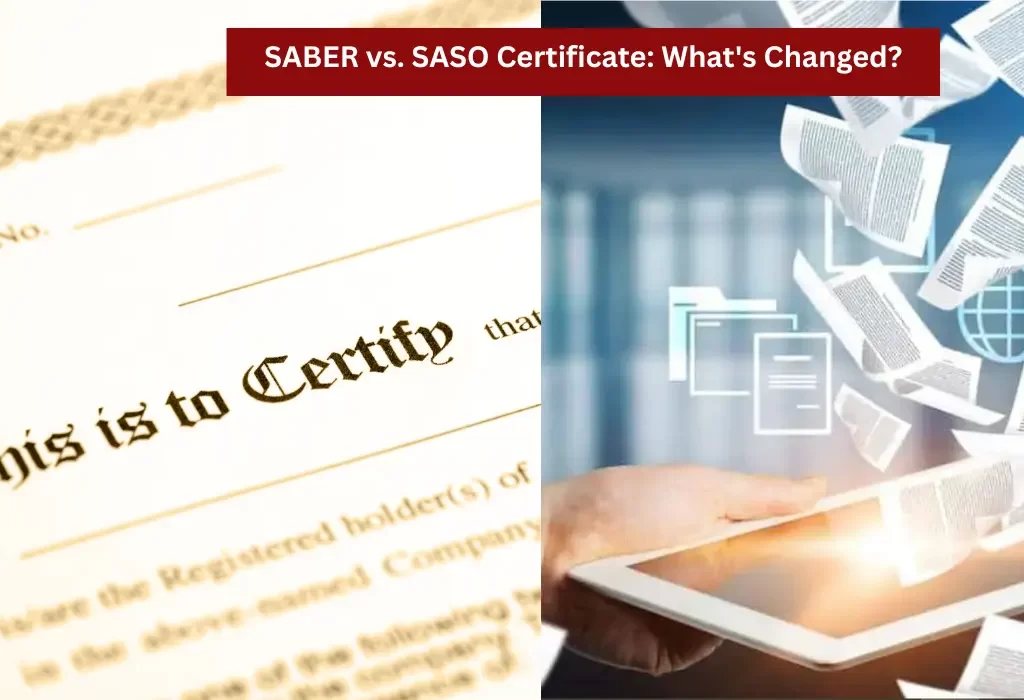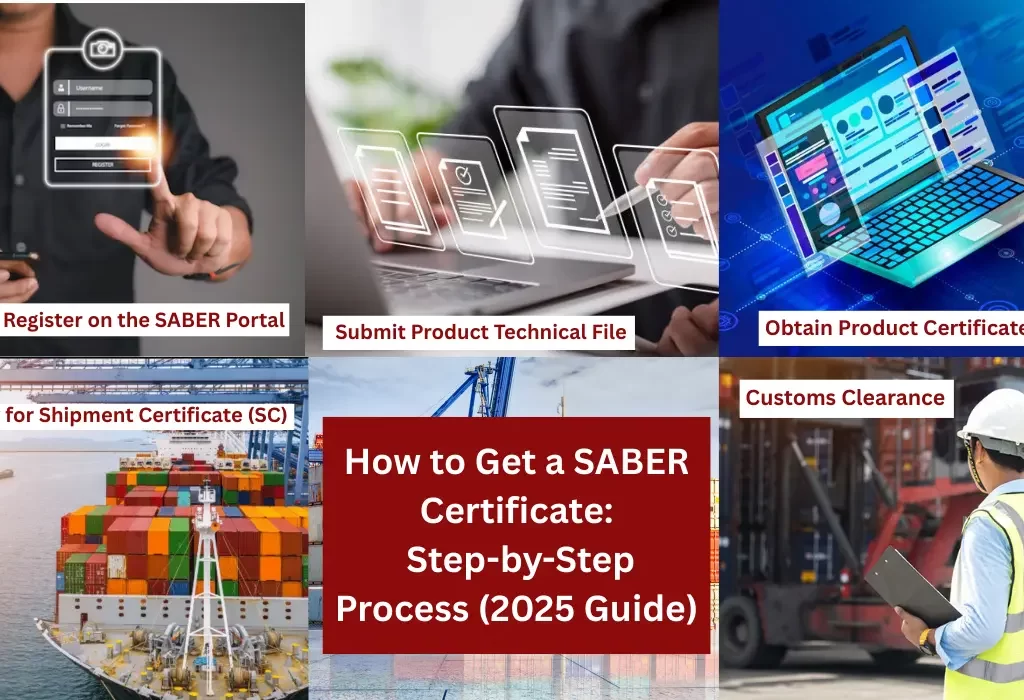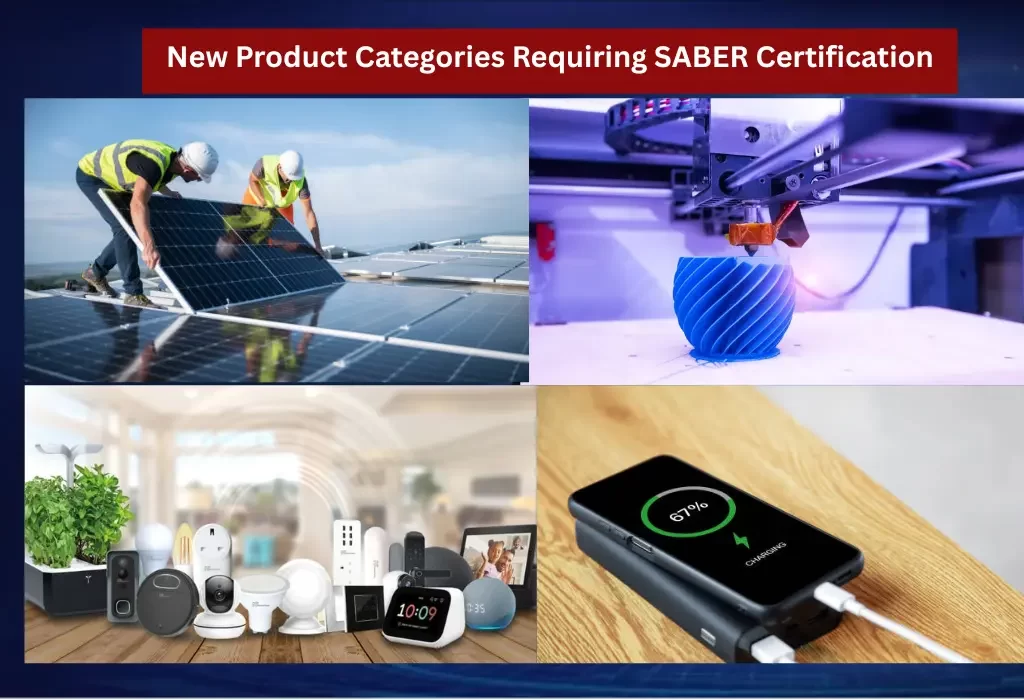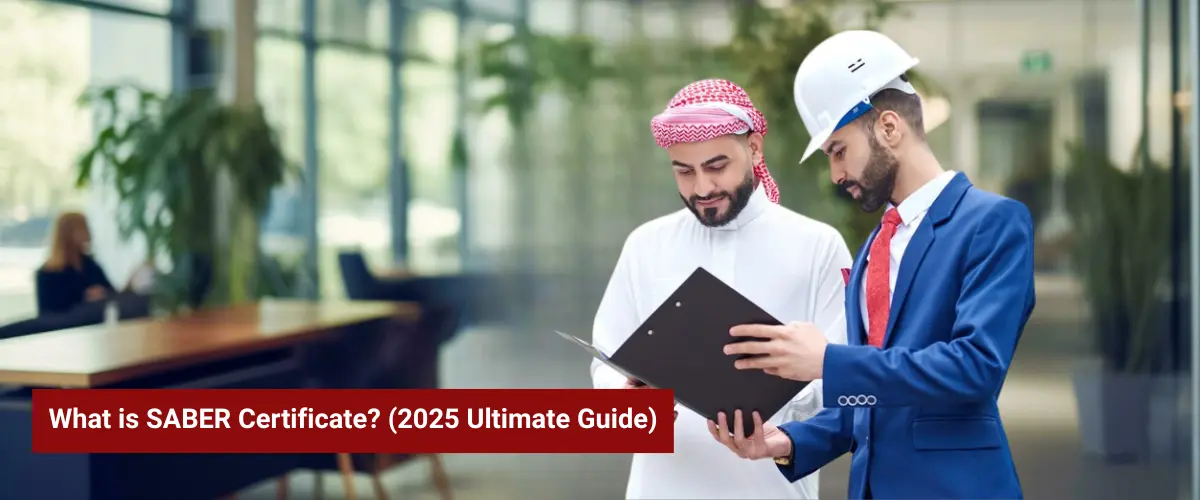Doing business in Saudi Arabia? If you’re importing goods, you must have a SABER Certificate—or risk costly delays, penalties, or even shipment rejections at Saudi ports.
The SABER Certificate (Saudi Product Safety Program) is an electronic certification system introduced by SASO (Saudi Standards, Metrology, and Quality Organization) to ensure that imported products meet the Kingdom’s strict safety, quality, and regulatory standards. Since replacing the old SASO Certificate, SABER has become a mandatory requirement for most commercial shipments entering Saudi Arabia.
Why is the SABER Certificate Required for Business?
Saudi Arabia has implemented strict customs regulations to protect consumers and maintain market quality. The SABER system:
✔ Prevents substandard or unsafe goods from entering the Saudi market.
✔ Streamlines customs clearance by digitizing compliance checks.
✔ Reduces smuggling & counterfeit products through verified documentation.
Without a valid SABER Certificate:
❌ Your shipment may be held at the port, incurring storage fees.
❌ You could face rejection or forced re-exportation of goods.
❌ Delays may disrupt supply chains, leading to lost revenue & contracts.
“A single missing document can cost thousands in delays. Don’t let compliance hurdles slow down your Saudi business—here’s your 2025 guide to securing a SABER Certificate smoothly.”
In this ultimate guide, we’ll break down:
🔹 What the SABER Certificate is & who needs it.
🔹 Step-by-step process to obtain it (without rejections).
🔹 Latest 2025 updates & how Radhi Custom Clearance Co. ensures fast, hassle-free certification.
Let’s get started!
What is SABER Certificate?
The SABER Certificate (officially known as the Saudi Product Safety Program) is Saudi Arabia’s mandatory digital certification system for imported goods. Operated through the SABER online platform, this electronic compliance system verifies that products meet the Kingdom’s strict safety, technical, and quality standards before they arrive at Saudi ports.
SABER vs. SASO Certificate: What’s Changed?

Prior to 2019, importers used the SASO Certificate (issued by the Saudi Standards, Metrology and Quality Organization). The new SABER system represents a major upgrade:
| Feature | Old SASO Certificate | New SABER Certificate |
| Process | Manual paperwork | Fully digital platform |
| Validity | Single certificate for all shipments | Two-step process (Product + Shipment Certificates) |
| Speed | Slower (weeks) | Faster (days in most cases) |
| Transparency | Less tracking | Real-time status updates |
Who Manages the SABER System?
The program is regulated by SASO (Saudi Standards, Metrology, and Quality Organization) in collaboration with Saudi Customs. All certificates must be issued through SASO-accredited Notified Bodies and Conformity Assessment Bodies (CABs).
Why Does Saudi Arabia Require SABER Certification?
The system serves three critical purposes:
- Consumer Protection – Blocks unsafe/non-compliant products (especially electronics, children’s toys, and construction materials)
- Customs Efficiency – Reduces port congestion by pre-clearing goods digitally
- Anti-Fraud Measure – Creates an auditable digital trail to combat counterfeit imports
Who Needs a SABER Certificate?
The SABER Certificate is mandatory for most commercial shipments entering Saudi Arabia. If you fall into any of these categories, you must obtain certification before your goods arrive at Saudi ports:
1. Businesses That Require SABER Certification
✅ Importers in Saudi Arabia – Any company bringing goods into KSA for resale or commercial use.
✅ Foreign Manufacturers & Exporters – Companies shipping products to Saudi distributors or buyers.
✅ Local Distributors – Saudi businesses sourcing products from international suppliers.
✅ E-commerce Sellers – Including platforms like Amazon.sa or Noon that import inventory in bulk.
2. Regulated Product Categories (2025 Update)
SABER certification applies to high-risk and consumer goods, including (but not limited to):
- Electrical & Electronics (phones, chargers, home appliances)
- Children’s Products (toys, school supplies, baby items)
- Automotive Parts (tires, batteries, brakes)
- Construction Materials (pipes, cables, cement)
- Chemical Products (cleaning agents, lubricants)
- Food Contact Materials (packaging, containers)
SASO periodically updates the list of regulated products. Always verify if your goods require certification on the SABER Portal.
3. Exemptions – When SABER Is NOT Required
Some goods are exempt from SABER certification, including:
- Personal shipments (non-commercial imports under SAR 1,000 value)
- Military/defense equipment (regulated separately)
- Pharmaceuticals & medical devices (controlled by SFDA)
- Used/second-hand goods (case-by-case approval)
What Happens If You Ship Without SABER?
❌ Customs holds – Goods detained at port until certification is provided.
❌ Financial penalties – Fines up to SAR 50,000 for non-compliance.
❌ Forced re-export – Shipments may be returned at the importer’s expense.
How to Get a SABER Certificate: Step-by-Step Process (2025 Guide)

Securing your SABER certification doesn’t have to be complicated. Follow this proven 5-step process to ensure smooth customs clearance for your Saudi-bound shipments:
Step 1: Register on the SABER Portal
- Create an importer/manufacturer account at saber.sa
- Required documents:
- Commercial Registration (for Saudi importers)
- ISO 9001 certificate (for manufacturers)
- Valid contact details
Processing Time: 1-3 business days for account verification
Step 2: Submit Product Technical File
- Prepare and upload:
- Detailed product specifications (English/Arabic)
- Test reports from SASO-approved labs
- Product photos and labeling details
- Manufacturer’s Declaration of Conformity
Radhi Custom Clearance Co. can help prepare error-free technical documentation to prevent rejections
Step 3: Obtain Product Certificate (PC)
- SASO reviews submitted documents
- Certification Body issues:
- PC (Product Certificate) – Valid for 1 year
- QM Certificate (for regulated products)
Typical Processing: 3-7 business days
Step 4: Apply for Shipment Certificate (SC)
- For each import shipment:
- Submit commercial invoice
- Provide packing list
- Attach bill of lading/airway bill
- Pay applicable fees
Note: SC must be obtained BEFORE goods arrive in Saudi ports
Step 5: Customs Clearance
- Present your:
- Valid SC
- Original PC
- SASO conformity documents
- Radhi Custom Clearance Co. can handle:
- Customs documentation
- Port clearance
- Final delivery coordination
SABER Processing Timeline & Costs
| Stage | Duration | Estimated Cost (SAR)* |
| Registration | 1-3 days | 500-1,000 |
| Product Testing | 5-10 days | 2,000-8,000 |
| PC Issuance | 3-7 days | 1,000-3,000 |
| SC per Shipment | 1-3 days | 500-2,000 |
Note: Costs vary by product category and certification body
Why 73% of Importers Face Delays:
- Incomplete test reports
- Incorrect HS code classification
- Last-minute SC applications
- Unapproved lab certifications
Required Documents for SABER Certification (2025 Update)
Having the correct documentation is the most critical factor in obtaining your SABER Certificate without delays. Based on our experience clearing thousands of shipments, here’s the complete 2025 document checklist:
1. Mandatory Documents for All Applications
📄 Company Registration Documents:
- Commercial Registration (CR) copy (for Saudi importers)
- ISO 9001 certificate (for manufacturers)
- Authorization letter (if using a Saudi agent)
📄 Product Identification:
- Detailed product specifications in English/Arabic
- High-resolution product photos (all angles)
- Labeling details with Arabic translations
- HS Code classification (6-8 digit Saudi customs code)
2. Product-Specific Requirements
A. Electrical & Electronic Goods
- Safety test reports (IEC/EN standards)
- EMC test reports
- SASO RoHS compliance certificate
- GCC conformity marking
B. Children’s Products & Toys
- Chemical safety test reports (EN 71-3)
- Physical/mechanical safety tests
- Choking hazard warnings in Arabic
- Age grading labels
C. Automotive Parts
- Material composition certificates
- Durability test reports
- SASO Energy Efficiency label (where applicable)
3. Special Cases & Additional Requirements
For food contact materials (packaging, containers):
- Migration test reports
- FDA/EU compliance certificates
- Halal certification (where applicable)
For construction materials:
- Fire resistance certificates
- Material safety data sheets
- Environmental impact statements
Document Preparation Tips
- Translation Matters: All documents must have:
- English + Arabic versions
- Notarized translations where required
- Test Report Validity:
- Must be issued within last 2 years
- From SASO-recognized labs only
- Cover all applicable Saudi standards
- Common Rejection Reasons:
- ❌ Expired test reports
- ❌ Missing Arabic labeling
- ❌ Incomplete product descriptions
- ❌ Unauthorized modifications to templates
Radhi Custom Clearance Co. document review service catches 92% of compliance issues before submission, saving clients an average of 14 days in processing time.
SABER Certificate Costs & Validity (2025 Pricing Guide)
Understanding the complete cost structure of SABER certification helps importers budget accurately and avoid unexpected expenses. Based on our latest clearance data, here’s the detailed breakdown:
1. 2025 Fee Structure for SABER Certification
A. Fixed Costs (One-Time Fees)
| Fee Type | Cost Range (SAR) | Notes |
| SABER Portal Registration | 500-1,000 | Valid for 1 year |
| Product Certificate (PC) | 1,500-5,000 | Depends on product risk level |
| Conformity Assessment | 2,000-15,000 | Varies by testing complexity |
B. Variable Costs (Per Shipment)
| Fee Type | Cost Range (SAR) | Frequency |
| Shipment Certificate (SC) | 500-3,000 | Required for every shipment |
| Customs Clearance Fees | 1%-5% of CIF value | Saudi Customs charges |
| Storage Fees (if delayed) | 100-500/day | At Saudi ports |
2. Validity Periods for PC, SC and Test Reports
| Certificate Type | Duration | Renewal Process |
| Product Certificate (PC) | 1 year | Full retesting required |
| Shipment Certificate (SC) | Single use | New SC for each shipment |
| Test Reports | 2 years | Must be updated before expiry |
3. Hidden Costs to Watch For
- Retesting Fees (if standards change during your PC validity period)
- Expedited Processing (50-100% premium for urgent applications)
- Document Translation (200-500 SAR per document)
- Storage Demurrage (avg. 300 SAR/day at Jeddah Islamic Port)
SABER Certification Challenges & How to Overcome Them (2025 Solutions)
Identified top 7 obstacles importers face – and more importantly, how to avoid them:
1. Document Rejections
Most Frequent Issues:
- Test reports from non-accredited labs
- Expired certificates (even by 1 day)
- Missing Arabic translations
- Incomplete product specifications
2. Testing Failures
Problem Products:
- Electronics failing Saudi voltage standards (110V vs 220V)
- Children’s toys with excessive phthalates
- Construction materials with incorrect fire ratings
3. Shipment Certificate Timing Errors
Critical Mistake:
Applying for SC after goods arrive at Saudi ports (leads to 100-300 SAR/day storage fees)
4. Product Category Confusion
Recent Changes to Note:
- As of March 2025, LED drivers now require separate certification
- Smart watches reclassified from electronics to medical devices
- New sustainability requirements for packaging materials
5. Technical Glitches on SABER Portal
Recent Issues:
- Document upload failures (especially >10MB files)
- Payment gateway errors
- Unexpected logout during application
Emergency Protocol:
- Use Chrome/Firefox (not Safari)
- Keep documents under 5MB
- Screenshot every submission step
6. Last-Minute Regulation Changes
2025 Updates That Caught Importers Off Guard:
- New labeling requirements for lithium batteries
- Additional testing for kitchen appliances
- Stricter documentation for used machinery
Latest 2025 SABER Updates: Critical Changes Importers Must Know
The SABER system continues to evolve, with major updates that impact certification requirements. Here’s what’s new in 2025:
1. New Product Categories Requiring SABER Certification

Starting September 1, 2025, these additional products must obtain SABER certification:
- Solar panels & renewable energy equipment (New SASO IEC 61215/61730 standards)
- 3D-printed consumer goods (Safety testing for materials)
- Smart home devices (IoT compliance requirements)
- Rechargeable power banks (Expanded battery safety checks)
Check if your products fall under these categories at saber.sa/regulated-products.
2. Mandatory Sustainability Compliance (Effective January 2026)
SASO now requires environmental impact documentation for:
- Plastic packaging (Recyclability reports)
- Electronics (Energy efficiency ratings)
- Textiles (Chemical usage disclosures)
Key Change:
- New “Eco-Conformity” certificate required alongside PC for affected goods.
- Penalties: Non-compliant shipments may face 5% additional customs fees.
3. Blockchain-Based Certificate Verification (Pilot Phase)
SASO is testing blockchain-tracked SABER certificates to:
✔ Reduce fraudulent certificates
✔ Enable instant customs verification
✔ Automate renewal reminders
How It Works:
- Each certificate gets a digital fingerprint on Saudi Customs’ blockchain.
- Authorities scan a QR code to verify authenticity in real time.
Currently in pilot for:
- Automotive parts
- Medical devices
- High-value electronics
(Expected full rollout by Q1 2026)
4. Revised Testing Requirements for High-Risk Products
Updated standards now apply to:
| Product | New Requirement | Testing Labs |
| Lithium batteries | UN38.3 + thermal runaway test | SASO-approved only |
| Children’s toys | Stricter phthalate limits (≤0.1%) | GCC-accredited |
| Food packaging | Migration tests for 20+ substances | SFDA-recognized |
5. Faster Processing for “Trusted Trader” Companies
SASO now offers expedited SABER approval (within 48 hours) for:
✅ Companies with 3+ years of clean compliance
✅ Businesses using SASO-registered agents (like Radhi Custom Clearance Co.)
✅ Shipments with pre-verified blockchain certificates
How to Qualify:
- Maintain zero rejections for 12 months
- Submit 3 successful SABER certifications
- Register for the Green Lane Program at saber.sa/trusted-trader
6. Digital-Only Submissions (No More Paper Documents)
As of March 2025, SASO no longer accepts:
❌ Physical application forms
❌ Hard-copy test reports
❌ Manual payment receipts
Required Format:
- All documents must be PDF/A (not scanned images)
- Digital signatures must match SABER portal records
How Radhi Awad Helps You Stay Compliant
We proactively monitor SASO updates and:
🔹 Alert clients 60 days before changes take effect
🔹 Update test reports before they expire
🔹 Resubmit revised applications at no extra cost
Ready for Hassle-Free SABER Certification? Let Radhi Awad Handle It!
Don’t risk delays, rejections, or costly penalties. Our SABER certification experts ensure:
✔ 100% compliant documentation – No rejections or resubmissions
✔ Fast-track approvals – As quick as 48 hours for trusted traders
✔ End-to-end support – From testing to customs clearance


Add a Comment